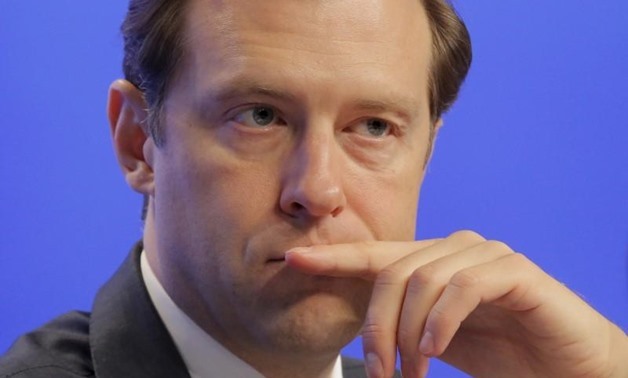
Russian Industry and Trade Minister Denis Manturov attends a session of the Energy Ministry's board in Moscow, Russia, April 8, 2016. REUTERS/Maxim Shemetov
CAIRO - 22 June 2019: Russian Minister of Industry and Trade Denis Manturov said on Friday that the free trade zone agreement between Egypt and the Eurasian Economic Union (EAEU) can be signed in 2020.
"I believe there is a chance to complete work and sign the agreement at the EAEU level next year," Manturov said.
He added that the opportunity to sign an agreement in 2020 was probed with Egyptian Minister of Trade and Industry Amr Nassar on the sidelines of St. Petersburg International Economic Forum in May.
The Eurasian Economic Union is an economic union of states located in central and northern Asia and Eastern Europe.
The Treaty on the Eurasian Economic Union was signed on May, 29, 2014 by the leaders of Belarus, Kazakhstan and Russia, and came into force on 1 January 2015.
In November 2018, Egypt and the Eurasian Economic Union signed a framework document for negotiations on the free trade agreement between the two sides, as they both decided to hold the first tournament of negotiations in mid- January in Cairo.
The document was signed by Egypt’s Minister of Trade and Industry Amr Nassar and Minister for Trade of the Eurasian Economic Commission Veronika Nikishina.
The Egyptian minister noted that this agreement came as a result of President Abdel Fatah al-Sisi’s visit to Russia in October, where he agreed with Chairman of the Eurasian Economic Commission Tigran Sargsyan on speeding up the negotiations related to the free trade between both sides.
According to Nassar, both sides agreed to hold a joint business forum during the first half of 2019 to boost the economic and trade partnership between businessmen of both sides and stressed on the necessity to complete a free trade agreement between Egypt and the Union’s countries in 2019.
Nassar said that this document targets to generate continued talks and negotiations about the bilateral economic and international cooperation between both sides and to enhance the economic and trade relationship as well as the liberalization of trade between them through the establishment of a long-term and stable institutional legal framework.
He explained that this agreement will contribute to the enhancement and development of the joint relations between Egypt and the Eurasian countries, including Russia, Belarus, Kazakhstan, Armenia and Kyrgyzstan.
The minister pointed out that Egypt is a major hub for the Union’s exports to various African and Arab markets and other economic blocs,with which Egypt has free trade agreements. The Eurasian countries also represent a distinct window for Egyptian exports in North and Central Asia as well as Europe.
Trade exchange between Egypt and Eurasian Union countries hit $6.78 billion in 2017, in which $6.24 billion represented Egypt’s imports and $544.7 million went for exports, according to the minister.
Nassar said that this agreement is expected to raise the trade volume between both sides to reach $15.7 billion, and to upgrade Egypt’s exports to the Union’s countries to $1.9 billion.
The minister referred that the most important Egyptian exports to Eurasian countries are agricultural commodities, machinery, equipment and pharmaceutical products, while the main imports to Egypt include wheat, minerals, chemical products, plastic products, cars and tractors.
He reiterated the need to encourage the business community and industrial companies from the Eurasian countries to increase their investments in Egypt during the coming period, especially in light of the Egyptian government's adoption of a number of mega projects, including the New Administrative Capital project,the development project of the Suez Canal and the Russian industrial zone in Egypt.
Nassar also emphasized the importance of the role played by the private sector in enhancing trade and investment relations between Egypt and the union’s countries.
For her part, Nikishina said that Egypt is one of the most important markets in the Middle East and Africa, and is a focal point for the transit of the products of the union countries to African countries.
She pointed out that the next phase will witness more cooperation between the two sides, especially after the signing of the Free Trade Agreement, which will make a quantum leap in the level of trade and economic relations Between Egypt and the Eurasian Union.


Comments
Leave a Comment